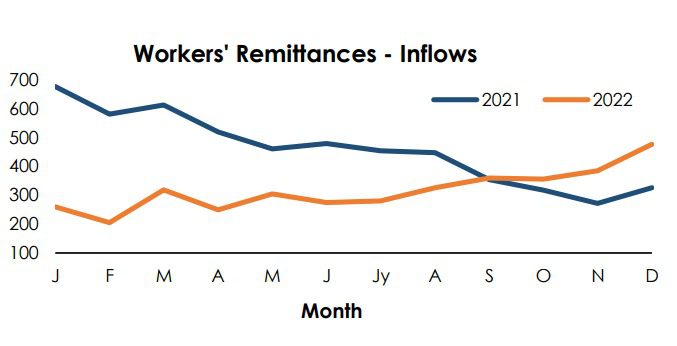General
Sri Lanka December remittances up 46-pct, but down for year


ECONOMYNEXT – The International Monetary Fund is working with China on extending maturities of Chinese loans to defaulted countries like Sri Lanka, as there is resistance to hair-cuts, Managing Director Kristalina Georgieva told reporters.
IMF had had discussions with China’s Finance Ministry, the People’s Bank of China, the China Development Bank and Exim Bank of China.
IMF had discussed with China to find “a pathway for debt resolution of Chad, Zambia, Sri Lanka, Suriname, to help China understand both the whole issue of debt sustainability and what can be a pathway for their contribution,” Georgrieva told reporters in Washington.
“China does not have the tradition of that coordination that exists in more mature lenders,” she said. “What is the biggest problem internally, domestically for China?
“It is the notion, and is actually very broadly shared by many officials and citizens in China, that China is still a developing country and therefore China will try to offer support to all developing countries it is genuinely with the objective to help, but also, they expect to be paid back because it is a developing country.”
“So a haircut in the Chinese context is politically very difficult, but they understood, after many interactions that there are ways in which they can reach the equivalency of a haircut by stretching maturities, reducing or eliminating interest rates, payments, and the Paris Club in their own engagement with China, so that there might be a way to reach the same objective in a way that in terms of reducing the burden of debt.”
Multilateral lenders line the World Bank and Asian Development Bank or the IMF itself do not usually give any debt relief to defaulting nations in the ordinary course of business.
Some bilateral lenders also may give maturity extensions. Both multi-lateral and Western lenders and Japan give concessionary debt where there is an identifiable ‘grant’ element.
There have been concerns that China Exim Bank (like Western Exim Banks) do not give such ‘aid’ which qualify for special treatment and China Development has been viewed by some as a regular commercial bank.
Meanwhile IMF says it will continue discussions.
” So, we of course, continue to discuss with China the value for China as a lender to have their exposure to countries defined in a way that is rational and then the countries can actually service that debt.” Georgieva said.
“But it is this is where the roundtable is so important to have that kind of substantive discussions with China and with everybody else.”
Sri Lanka, a country which survived a 30 year war defaulted in April 2022, after 7 years of monetary instability under a ‘data driven’ flexible inflation targeting where large volumes of money was printed to chase a high inflation target (as much as 5 percent or more) until forex shortages emerged.
The the impossible trinity regime was bombarded with all manner of floating rate style open market operations (overnight reverse repo, term repo, outright purchases, yield curve targeting, operation twist and output gap targeting (stimulus) until the peg collapsed repeatedly amid forex shortages.
The forex shortages made it difficult to pay maturing debt, leading to extensive monetary instability borrowings for imports and debt repayment.
Sri Lanka’s foreign debt after reserves which was about 17 billion dollars in 2015 after almost 65 years of foreign borrowings jumped to 32 billion dollars over 7 year’s of data drive flexible high inflation targeting and stimulus.
At each currency crises from the ‘impossible trinity’ flexible inflation targeting, growth collapsed as stabilization polices were applied, expanding the debt to GDP ratio, slowing the expansion of the denominator, while depreciation under ‘exchange rate as the first line of defence’ expanded foreign debt value and killed domestic purchasing power.
IMF is planning a Global Sovereign Roundtable with Paris Club, China, India, Saudi Arabia, bilateral creditors, private finance, as well as some of the borrowing members of those that are debtor countries with the IMF and the World Bank.
The roundtable is expected to fine tune the current shaky sovereign debt resolution framework.
The IMF is planning a roundtable around the next Spring or Annual meetings of the IMF and World Bank where global central bank government and finance ministers get together. (Colombo/Jan14/2022)








